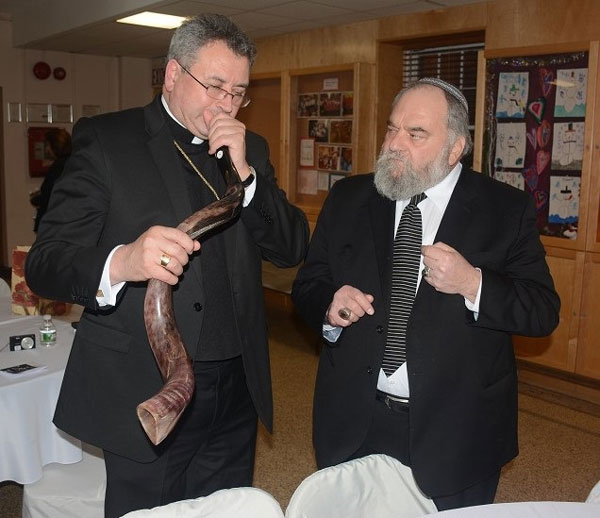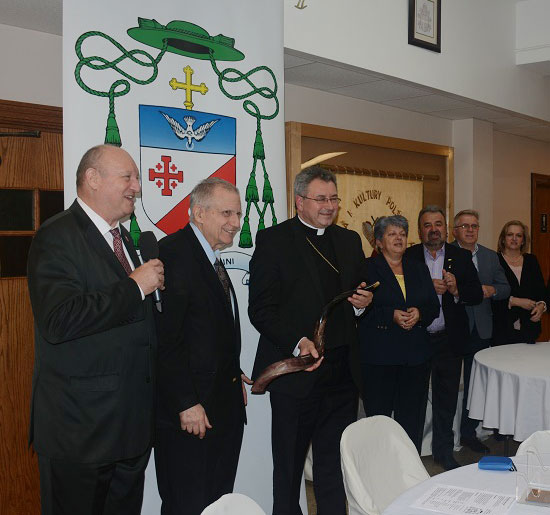
By Michael Rizzo
“He’s our linkage to the Church. He says the Church is with you.”
That’s how Jeff Gottlieb, co-chairman of New York’s Polish-Jewish Dialogue Committee, described Polish native and Auxiliary Bishop Witold Mroziewski as the group honored him March 2 for his support for them and his 25th anniversary of his ordination, which he marked last year.
In the community room at Holy Cross Church, Maspeth, where Bishop Mroziewski is pastor, about 100 people gathered including parishioners, Jewish members of the committee, religious of the diocese and representatives of the Polish community.
The highlight was the presentation to the bishop of a shofar, a hollowed out animal horn sounded for special Jewish religious services. The one given to the bishop was from an Israeli Ibex, a goat native to the Middle East.
“The bishop came from a land that fought for liberty,” Rabbi Moses Birnbaum, one of the founders of the committee, said of the bishop’s Polish ancestry. “Now he’s come to share the spirit of liberty with us and we’ve given him what we use to broadcast our liberty.”
“I cannot play it,” Bishop Mroziewski said of the shofar, “but I will try to learn.”
The bishop worked with the committee and parishioners in 2014, when he was Father Mroziewski, to get 56th Road in Maspeth renamed Pope John Paul II Way. The group also arranged a day for lawyers, who spoke both Polish and English, to help Polish-speaking residents with legal issues.
The bishop said it was a great surprise that the committee wanted to honor him.
The agenda featured speakers extolling the close-knit nature of the Polish community in New York, the connection between Catholics and Jews in Poland, including the Solidarity movement in the 1980s that contributed to the downfall of Poland’s Communist rule, and the efforts of the current Polish government to support a greater Jewish-Catholic relationship.

After Bishop Mroziewski was presented with the shofar, the attendees spontaneously serenaded him with “Sto lat,” the traditional Polish song of good wishes, and gave him a standing ovation.
In formal remarks, Bishop Mroziewski noted the committee’s teamwork with the street renaming and reminded attendees that St. Pope John Paul II encouraged everyone to dialogue in faith. He also spoke of how Pope Francis reminds all people to work together and respect one another and said those efforts are much needed in today’s world.
“I am grateful to see people who put others in front of themselves in the name of justice and peace,” the bishop said of the committee and his work with it.
Dr. Iwona Korga, a Holy Cross parishioner and historian for the Pilsudski Institute of America, has known Bishop Mroziewski for many years.
“They understand he is here to help unite the different groups of Polish people,” she said of the committee. “The dialogue between the groups is needed for each to learn more.”
Father Grzegorz Stasiak, the diocese’s coordinator for ministry to Polish immigrants, praised the committee for honoring the bishop. He said he was optimistic that the continuing Jewish-Catholic dialogue will encourage everyone to be more involved in issues related to the Polish-American community.
Gottlieb, who reminded those assembled that New York has surpassed Chicago as the largest city with a Polish population outside of Poland, also said the committee had worked with the late Msgr. Peter Zendzian, pastor of St. Matthias in Ridgewood. He said Bishop Mroziewski’s enthusiasm toward working with committee members made for an immediate connection and that’s reflected in their shared goal to solve problems.
“We want to build a bridge to the Christian world, especially the Polish-Christian world,” Gottlieb said. “We want to speak at Catholic schools and have Catholics speak at our schools to foster greater understanding.”
Bishop Mroziewski echoed similar sentiments.
“The Church has to be open to dialogue with other religions,” he said, “so we can present our best to them with our beliefs and actions in the love given to our neighbors.”
